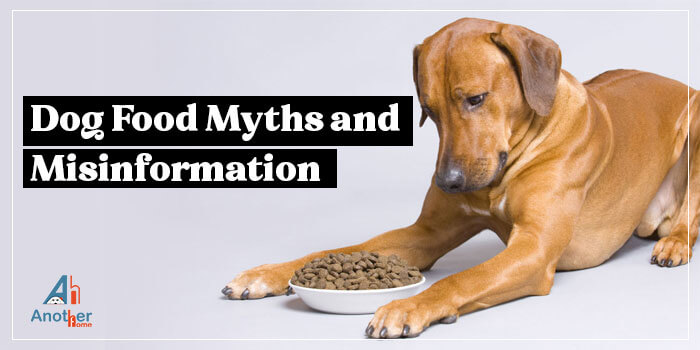The food that you give your pets affects all aspects of the pet’s life and health. Including their coat, energy levels and overall well-being. A lot of veterinarians make sure to educate pet owners about the proper care of their pets. Unfortunately, most of this education necessarily focuses on challenging misinformation. It is common among pet owners to readily pick up myths and misconceptions. The World Wide Web is majorly responsible for contributing to the formation of myths and misconceptions. Breeders and fellow pet owners have an equal contribution in spreading dog food myths and misinformation.
Dog Food Myths and Misinformation
Nutrition is the largest area with widespread myths and misinformation. Pet owners are always looking out to find the “right” food for their animal companions. This is one of the major factors related to health which they can control. It is crucial to get the facts checked before getting into any food myth.
Related Article:The Best Dog Boarding Services Near You to Trust
Our pets are resilient and are able to thrive on a variety of diets. In most cases, nutrition is only one of many variables interacting in complex and subtle ways to impact health. The perfect food for pets does not exist and the pressure to find the perfect diet can easily persuade you to fall for dog food myths and misinformation. It can compel you to choose extreme and unhealthy choices.
The pet owners who start investigating feeding options for their pets by going beyond the traditional canned and dry commercial diets can get an insight into the negative health effects of such diets. In order to make a rational food choice for your dog and find the perfect diet as per your dog’s needs, it is crucial to debunk some common food myths.
1. Dog Food Myth, “High-protein diets cause kidney failure”.
The idea that access to protein causes kidney failure arises from the fact that high levels of protein are historically ill-advised for dogs with kidney failure. But for the dogs with normal kidney function must have a reasonable amount of protein. By feeding a moderate level of high-quality protein is good and won’t lead to any health hazard.
2. Dog Food Myth, “Meat is more nutritious than meat meal”.
While purchasing dog food, if you compare the ingredient lists then the meat is a vital element in it. If your objective is to have the most meat nutrients, then go with a meat meal. Ingredients appear in descending order of their weight; that weight includes any water in the ingredient. When you see chicken listed as an ingredient, it means unprocessed chicken, complete with water. Chicken meal means chicken with the water and fat removed. It weighs less than chicken but actually can contain a higher percentage of protein.
3. Dog Food Myth, “Feed raw eggs for shinny coat”.
Eggs are a good source of protein for not just humans but dogs as well. It contains fat, and vitamins, all essential to hair growth and skin health. One of those vitamins is biotin, which is important for cell growth and fatty acid metabolism. While egg whites contain avidin, a biotin inhibitor, the yolks contain enough biotin to make up for it. Eggs to help dogs get a shinny coat but feeding them raw is not ideal. An egg is a good source of protein and other nutrients, but probably no better than any good diet at promoting a shiny coat.
4. Dog Food Myth, “Dogs don’t like variety”.
It is true that dogs prefer a non-varied diet and do not prefer new foods readily. But the dogs who are raised on a varied diet prefer a good variety. Viewing from a nutritional standpoint, it is vital for an animal to crave nutrients that its current diet lacks.
Final Words!
Another Home is a safe and friendly dog boarding near me with great facilities for your dog. Being one of the best pet care centers, it is a safe place for your dogs. You can tension-freely leave your pets with us. We are equipment and toys to make your dog feel safe and happy while you are away.











